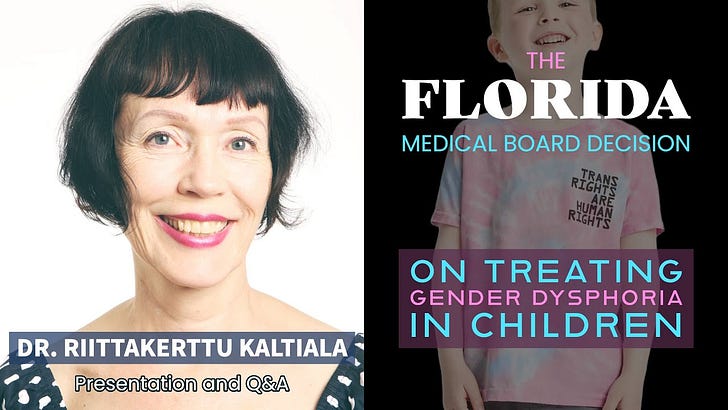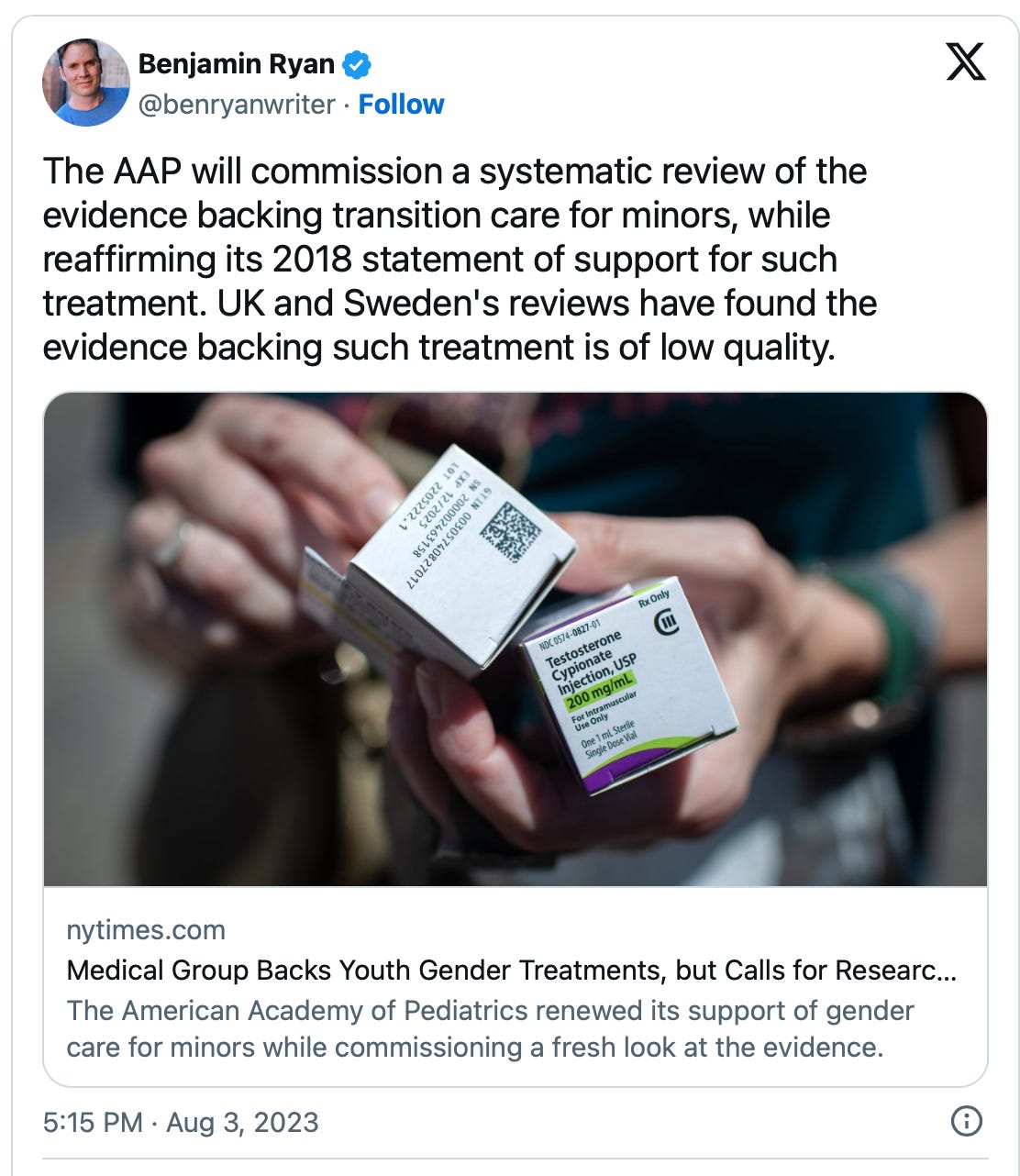Finland’s Dr. Riittakerttu Kaltiala on U.S. Medical Establishment’s Dismissal of ‘Dangers’ of ‘Gender-Affirming’ Treatment for Children: ‘Science Does Not Progress Through Silencing’
Finnish-born psychiatrist Dr. Riittakerttu Kaltiala was among the first of physicians in the world to oversee a “gender clinic” for children and teens.
Now, in a piece on Monday at The Free Press, Kaltiala explains how her country and others have recognized “the dangers” of what activists call “gender-affirming care,” and wonders how long it will take American doctors to heed their warnings.
Transgender medicine, Kaltiala observes, had its start in the 1950s, when “small numbers of mostly adult men with lifelong distress” were being treated with estrogen and surgeries so they could live as women.
Within the last 15 years, however, some medical professionals applied the same model to young people.
The “Dutch protocol,” she notes, was published in 2011, and promoted the idea that early intervention, for what were mostly young males who claimed to be girls, allowed them to live successfully as members of the opposite sex.
“The protocol was quickly adopted internationally as the gold standard treatment in this new field of pediatric gender medicine,” Kaltiala explains, adding that, at the same time, “an activist movement that declared gender transition was not just a medical procedure, but a human right,” garnered significant media attention via social media platforms.
“In response to all this, in Finland the Ministry of Social Affairs and Health wanted to create a national pediatric gender program,” Kaltiala reports about the start of her own involvement in gender medical services. “The task was given to the two hospitals that already housed gender identity services for adults. In 2011, my department was tasked with opening this new service, and I as the chief psychiatrist became the head of it.”
Despite questions about the bioethics of treating young people with hormone drugs, Finland’s nationalized healthcare system’s procedures for approvals allowed the new treatment model to move forward.
Nevertheless, Kaltiala says the new gender identity medical service started off with “many surprises.”
“Not only did the patients come, they came in droves,” she says. “Around the Western world the numbers of gender-dysphoric children were skyrocketing.”
Kaltiala notes she was seeing some striking differences from the “Dutch protocol”:
But the ones who came were nothing like what was described by the Dutch. We expected a small number of boys who had persistently declared they were girls. Instead, 90 percent of our patients were girls, mainly 15 to 17 years old, and instead of being high-functioning, the vast majority presented with severe psychiatric conditions.
Many of the girls referred to her gender clinic arrived from “families with multiple psychosocial problems,” including early childhood “developmental difficulties, such as extreme temper tantrums and social isolation,” school-related issues, depression, anxiety, eating disorders, and self-harming behaviors.
Kaltiala especially notes that many of the girls referred to her gender clinic had been “bullied,” but “generally not regarding their gender presentation,” and that “many – many – were on the autism spectrum.”
“Remarkably, few had expressed any gender dysphoria until their sudden announcement of it in adolescence,” she continues, adding:
Now, they were coming to us because their parents, usually just mothers, had been told by someone in an LGBT organization that gender identity was their child’s real problem, or the child had seen something online about the benefits of transition.
The stark differences between her own patient population and that described by the Dutch led Kaltiala to consult with other European medical professionals.
“I found out that everybody was dealing with a similar caseload of girls with multiple psychiatric problems,” she reports, adding what she noticed was happening among medical professionals as well:
But no one was saying anything publicly. There was a feeling of pressure to provide what was supposed to be a wonderful new treatment. I felt in myself, and saw in others, a crisis of confidence. People stopped trusting their own observations about what was happening.
Not long after Kaltiala’s gender clinic was opened for business, she and her colleagues realized their “miracle” treatment was a debacle.
“The young people we were treating were not thriving,” she explains. “Instead, their lives were deteriorating.”
This state of affairs apparently was not reported, however.
Indeed, in November 2022, Kaltiala appeared (above) before the Florida Board of Medicine and the Florida Board of Osteopathic Medicine to present her findings.
“Literature and the research on the impact of gender reassignment on mental health is lousy at best,” she told the joint gathering.
Kaltiala continues at The Free Press that, in 2015, she and her colleagues published a paper about their concerns regarding the failures of the program, hoping it would spur the medical field to “correct itself.”
“But our field, instead of acknowledging the problems we described, became more committed to expanding these treatments,” she laments, noting that, since 2007, when the first pediatric gender clinic opened in the United States, more than 100 such clinics in this country are now offering “gender-affirming care.”
In 2016, however, Kaltiala explains, Finland’s two pediatric gender services altered their procedures, referring patients who appeared to have more prominent psychiatric problems for counseling, rather than for gender identity assessment.
“There was a lot of pressure against this approach from activists, politicians, and the media,” she observes.
Nevertheless, with the onset of “detransitioners” openly expressing their regrets about their gender transition treatments, the “Dutch protocol,” which dismissed such negativity, was shown to have “serious problems.”
Kaltiala’s essay is published one week after The Daily Wire reported Isabelle Ayala, 20, who was recommended for hormone drug therapy as a young teen while hospitalized at Hasbro Children’s Hospital in Rhode Island for suicidal thoughts, has now filed a lawsuit against both her doctors and the American Academy of Pediatrics (AAP).
The doctors who treated Ayala and AAP, according to the complaint, “created, promoted, and have continued to advocated [sic] for” the “gender-affirming care” model of treatment.
The lawsuit argues Ayala was recommended for “hormonal transition” to resolve her mental health issues, during a brief initial meeting with Dr. Jason Rafferty. Six months after she began cross-sex hormone treatment with testosterone, however, her depression grew worse, and she made a suicide attempt.
The complaint describes Ayala’s current state as a result of the testosterone treatments, including “vaginal atrophy;” “excess facial and body hair;” “compromised bone structure;” and unknown “fertility”:
Isabelle is now twenty years old and longs for what could have been and to have her healthy, female body back. The changes the testosterone have had on her body are a constant reminder that she needed an unbiased medical expert willing to evaluate her mental health and provide her the care she needed, rather than a group of ideologues set on promoting their own agenda and furthering a broader conspiracy at her expense.
Finland’s national medical body released its finding in June 2020 that the studies promoting the “gender-affirming” model “were biased and unreliable – systematically so in some cases,” Kaltiala says, noting the UK and Sweden have drawn similar conclusions.
“And many other countries with national healthcare systems are re-evaluating their ‘gender-affirming’ stance,” she observes, but adds, “However, in the U.S. these groups—including the American Academy of Pediatrics—have been actively hostile to the message my colleagues and I are urging.”
“This is highly disturbing,” Kaltiala asserts. “Science does not progress through silencing. Doctors who refuse to consider evidence presented by critics are putting patient safety at risk.”
In August, AAP announced it would be conducting a systematic review of the research on “gender-affirming” care for minors.
Meanwhile, the organization reaffirmed its 2018 statement of support for hormone drugs and surgeries for children and teens who claim to be uncomfortable with their biological sex.




